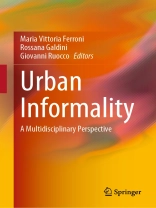This book analyzes the informal practices of contemporary cities through a close dialogue between different research perspectives, with the shared goal of giving voice to informality and evaluating its benefits and potential in a multidimensional key of social factors.
Recently, the human sciences have seen the emergence of this new term “informality, ” at first sight in conflict with their function of giving order and form to social phenomena. A term with which, in this book, the authors, having as reference the Italian and European experience, specifically identify those unsatisfied social demands and those collective actions “from below” that aim at the recovery of urban space and the renewal of its organization, often not following the trajectories of legality and institutions. By means of a close dialogue between different areas of social research, this book attempts to establish the different declinations and applications of the term, evaluating the causes and effects, benefits, and potential of the phenomena attributable to it, within a multidimensional analysis that calls into question the regeneration and collective use of spaces, political-institutional confrontation and conflict, legal innovation, and social-economic benefits.
Table of Content
Informality: a difficult qualification.- Informality and evolution of the urban space.- Collective action, urban spaces, and common goods: the concept of informality from a sociological perspective.- Informality and democratic innovation: the urban political laboratory.- The legal value of informality for the general interest. The example of cities.- The reuse of assets confiscated from organized crime: how to make the informal formal.- The role of “intangible factors” for local development: policy indications and initial evaluation indicators.- Urban regeneration and informal city in the European framework.- Historicizing urban informality. An opportunity to rethink the study of the contemporary city.- Informality as a way of living in the city. The point of view of urban practices to rethink the categories of urban governance.
About the author
Maria Vittoria Ferroni is Associate Professor at the Department of Political Sciences at the Sapienza University of Rome, where she teaches Administrative Law. Since 2013, she is Member of the Doctoral Board of Public, Comparative and International Law. Since 2016, she is Coordinator of the Environmental Law Observatory of giustamm.it and Member of the Italian Association of Urban Planning Law (AIDU). Since 2019, she coordinates the multidisciplinary research group cities in transition, urban regeneration, civic engagement, and institutions at the origin of this book.
Rossana Galdini is Associate Professor of Sociology of Environment and Territory at the Department of Social and Economic Sciences at Sapienza University of Rome, where she teaches Urban Sociology and Sociology of Environment and Territory. Her main research fields are concerned with the city as a mix of social dynamics, architectural forms, and productive structures. She is Member of the Doctoral School of Applied Social Sciences at Sapienza University. She is Author and Co-author of several national and international articles and publications. She coordinates the interdisciplinary research: “Towards a new culture-centered city. Strategies and practices for a high quality urban sustainable development”.
Giovanni Ruocco is Associate Professor at the Department of Political Sciences of Sapienza University of Rome, where he teaches Political Thought of Colonisation and Decolonisation and Democracy and Critique of Contemporary Societies. He is Member of the Board of Doctorate in Political Studies. He studies the political thought of the modern and contemporary age, with particular attention to conceptual problems, the doctrines of races and racism, and reflection on the forms of democratic participation. With other colleagues, he published three volumes on the idea of the people in the history of modern and contemporary thought and is preparing the fourth.












